- Home
- H A CULLEY
Dawn of Empire Page 2
Dawn of Empire Read online
Page 2
The assembled captains of a thousand consisted of ten who were in charge of militia infantry units, two who commanded the professional spearmen, one who commanded the archers and the slingers, Dadanum of the camel troops, Warad Sin, who led the chariots, the commander of a hundred horsemen and, finally, Abi-Maras who looked after the army’s logistics and the engineers. He was the eldest son of Isiratuu, the chief minister, and had been the first governor of the new city of Kid-nun. He had been recalled to Babylon a few years ago and was proving to be something of a genius in his new role, but Mutu-Namaha had heard rumours about the real reason for the move. Hammurabi had wanted his only surviving sister, who was married to Abi-Maras, closer to him after the death of his mother and eldest son six years previously.
Arishaka looked round the room, fixing each of the sixteen men present in turn with his eyes before he spoke.
‘Men, Elam has overrun Eshnunna and has crossed the Tigris to besiege Upi.’ The shock that this bald statement evinced was almost palpable. The boy felt as if he could have cut the atmosphere with his knife.
‘Obviously we need to move to relieve the city as quickly as possible but a knee-jerk reaction that fails would be disastrous. We therefore need to mobilise the militia here and at the other cities swiftly and march with our maximum strength. Now, we have practiced mobilisation enough times and it always seems to take a week. What I need you to do now is to gather your men within forty eight hours. Can you do it?’
The commanders looked at each other before the senior militia captain spoke.
‘We can do our best to do so. Those who are late will have to march at night to catch the rest of us up.’ Arishaka nodded his thanks.
‘What about provisions and other supplies? What about the siege train?’ Abi-Maras wanted to know.
‘Take provisions for a week initially and then arranged for regular supply caravans from each city for their own men. No siege train. Our task is to relieve Upi so speed is of the essence. If we are too late and it has fallen so we have to retake it, we will have time to bring up your engineers and their kit.’
After a few more detailed questions the meeting broke up and those present set off to brief their own commanders of a hundred.
~#~
The Elamites had invaded Eshnunna with thirty thousand men but they had lost some during the sack of Eshnunna, even though the gates had been opened by traitors in the pay of Kudu-Zulush, the King of Susa, who was in command of the invasion. More were required to garrison the city and the other cities and towns that made up the kingdom of Eshnunna; not that it was a kingdom any more.
Ibal-pi-El, his queen, their two infant children, all his concubines and all their children had been executed. Kudu-Zulush had issued a decree stating that Eshnunna and all the lands controlled by the former city-state were now part of greater Elam and he didn’t intend to leave anyone from the previous ruling dynasty alive to challenge that. The one person he couldn’t eliminate, however, was Ibal-pi-El’s sister – Adiar, Queen of Babylon. That was something that worried him and he began to think how he might achieve her demise too.
Once he had garrisoned Eshnunna he was left with twenty two thousand men with which to invest Upi. His instructions from Siwe-Palar-Hupak, his overlord, were quite clear. He was to capture Upi as a possible bridgehead for a later invasion of Babylonia but he was not to venture any further into Hammurabi’s territory. Sensibly, Siwe-Palar-Hupak was concerned about overstretching himself. Kudu-Zulush of Susa, on the other hand, was headstrong and used to ignoring instructions from the King of Elam when it suited him.
The city of Upi had been built by Ashlatum, Hammurabi’s mother, as the northern outpost of Babylon on the Tigris. It had therefore been constructed with just such a siege in mind as was now taking place. The walls were not particularly high but they sat on the far side of a wide ditch which was filled with water diverted from the Tigris to prevent the use of assault ladders. There were only two gates into the city, the road entrance from the south and the water gate which led to the quayside on the river. It was impossible to get a battering ram up to the water gate; the only approach was alongside the walls and those hauling it would be vulnerable to attack from above by rocks and burning oil. Even if it reached the water gate by some miracle, there was no space in which to charge the gates, as the wharf was only five yards wide at that point.
The main gate was equally well protected. The water in the ditch was crossed by a wooden bridge. The far end of the bridge was protected by a fort with four towers and another gate. The Elamites would have to capture this before they could gain access to the bridge. If it looked like this was imminent, the Babylonians could easily sally out and destroy the bridge before the fort fell.
Kudu-Zulush studied the defences for some time before admitting to himself that this city would be a difficult one to capture. They had managed to collect together enough boats to ferry half of his army across the Tigris before they were attacked by Babylonian boats carrying archers. They had not only peppered his troops crowded onto the ferries, killing and wounding so many that the rest of his men were unwilling to attempt the crossing, but the Babylonian archers had then fired volley after volley of fire arrows into the ferries, burning many of them so badly that they were unusable.
Having gained control of the river, the Babylonian boats could then resupply Upi without hindrance. The river was wide enough so that a boat that remained in the centre of the river could stay out of effective arrow range until it was under the walls of the city.
However, under cover of night the Elamites managed to get a rope across the river to the south of the city so, for the time being at any rate, the supply boats were prevented from reaching Upi. Kudu-Zulush didn’t think it would be long before someone managed to cut the rope so starving the city into submission didn’t seem like much of an option. The only progress he had made was finding another crossing point further upstream in Assyrian territory. For a hefty bribe Ishme-Dagan agreed to allow the Elamites to cross the river but he refused to get drawn into the conflict.
The Elamites had only just finished consolidating their forces around Upi when a messenger arrived from the small force Kudu-Zulush had sent to watch the approaches from the south.
‘Lord king, a vast host is approaching from Kid-nun.’ The messenger knelt in front of his king quivering with fear. He had a reputation for killing those who brought unwelcome tidings.
‘How vast. I need details. How far away are they?’
‘Three days’ march at least, lord king. My captain sent out scouts to estimate their numbers and he calculated that there were a hundred chariots, perhaps five hundred camels with archers, a hundred horsemen, a thousand archers, another thousand slingers and ten thousand infantry. There is also a large baggage train consisting of another five hundred camels and several hundred carts drawn by onagers.’
‘Your captain knows his business it seems. Anything else?’
The man hesitated. ‘One of the chariots is flying a red banner, lord. My captain says this this is the personal banner of King Hammurabi himself.’ The man was obviously in awe of the Babylonian leader, which was not encouraging if the rest of the Elamite army felt the same. Still, the King of Susa comforted himself, he outnumbered the Babylonian army by nearly two to one.
During the three days he had to prepare, Kudu-Zulush constructed a ditch and palisade in front of Upi’s main gate and manned this fortification with two thousand men to prevent a sally from Upi taking him in the rear. He had two hundred chariots, twice the Babylonian numbers, and he drew these up in front of the massed ranks of his infantry. He placed his eight hundred archers in between the two and sat under the shade of a parasol waiting for the enemy to arrive.
~#~
Hammurabi had no intention of attacking Kudu-Zulush as soon as he arrived before Upi. He was well aware that he was badly outnumbered and, although he was confident that superior weapons, training and tactics would gain him the day in the end, it would no do
ubt be at a significant cost and he needed to conserve his manpower for the future.
When he arrived on the plain to the south of Upi he camped on the top of a small ridge and got his men to construct defensive works in the form of sharpened stakes all along the forward slope of the ridge. He then allowed his men to relax and to fetch water in turn from the nearby Tigris. Thus his men were refreshed whilst the Elamites suffered, standing in battle array under the fierce heat of the midday sun.
Once it was clear that there would be no battle that day, the Elamites were allowed to stand down and they returned to their camp for the night. This was a mistake. The camp was designed to face Upi, and had no defences facing the south. Four hours after dusk Hammurabi’s camel troops descended on the enemy camp. Every man carried a blazing torch which they threw into the lines of tethered onagers, at the closely packed ranks of parked up chariots and at the shelters of barusti built by the men looking after the animals to provide a roof over their heads.
The onagers panicked and stampeded away from the camp as fast as they could go, several of the chariots caught light and the shelters, made of dried palm fronds as they were, quickly burned down to nothing, killing those inside who were not quick enough to get out. After firing several volleys of arrows into the milling, disorganised enemy, the camel riders disappeared back into the night as quickly as they had appeared.
Dadanum, the commander of a thousand who led the camel archers, returned to report to Hammurabi with a contented smile on his face. He had only lost six camels and ten men in the raid; a small price to pay for the damage it would have done – not just to the Elamites’ fighting strength but, more importantly, to their morale.
When the two armies formed up again the next day it was apparent that the Elamites had lost nearly half their chariots, or didn’t have the onagers to draw them, and their numbers had also shrunk quite noticeably. Arishaka expressed surprise to his brother that Dadanum had managed to kill quite so many during the night raid.
‘I’m sure he didn’t. The rest will have deserted in the night.’ Then Hammurabi shaded his eyes and looked to the west where a barely distinguishable dust cloud had appeared. ‘Ah, that looks like the contingents from Kish and Borsippa. I think we will wait until their imminent arrival is apparent before we ride forward to negotiate with Kudu-Zulush.’
Hammurabi had marched as soon as the Babylon army had mustered, collecting the men from Sippar and Kid-nun on the way. Kish and Borsippa had taken another day to mobilise and had a little further to travel. He expected them to bring another eight thousand men to join him. He hope that their arrival would be a surprise for the King of Susa, as would the fact that he had sent a mixed force of three thousand round to the north to cut off any retreat in that direction. He had sent orders earlier in the day for this army to march south so that the Elamites could see that they were trapped.
When both of the other dust clouds were very obvious and muttering had started in the Elamite ranks as a result, Hammurabi told his driver to walk his chariot forward. He was escorted by fifty horsemen and a hundred camel archers. When he was halfway between the two opposing armies he halted and waited for Kudu-Zulush. Even Hammurabi hadn’t anticipated what happened next.
Chapter Two – The Battle of Upi – 1770 BCE
Nidintu, governor of Upi, was a small man who dressed fastidiously. However, he was much more than the capable administrator that his position demanded. He had been one of Hammurabi’s captains before his current appointment and he was well known for his clear tactical insights and ability to seize the initiative. He had watched the two armies form up with interest and not a little trepidation about the likely outcome of the battle. Then something made him look up at the horizon and he saw dust clouds to the north and west which gradually materialised in marching armies. It was another hot day and the marching men looked as if they were walking over a lake as they approached across the flat, arid plain that surrounded Upi and the agricultural land along the river bank. He suspected that they had to be Babylonian, especially the one from the west but he couldn’t be certain. The men shimmered in the heat haze but, as they drew closer, his assumption was confirmed as he could just make out the blue banners of Babylon flying above the lead chariots.
His eyes swept back to the tableau in front of him. Hammurabi had moved forward with a small escort to talk to the enemy, but there was no sign of a similar move by Kudu-Zulush. His gaze swept on to the two thousand Elamites behind their breastworks in front of the main gates. There was a gap of a thousand yards or more between them and the rear ranks of the main Elamite army. What the King of Susa seemed to have forgotten was the water gate. Slowly a plan formed in the mind of Nidintu and he started to issue orders.
Hammurabi had just about given up and was about to return to his own lines when he saw movement in the Elamite ranks. A chariot flying the yellow and green banner of Susa was lumbering towards him, drawn by four onagers. It was escorted by ten other chariots and two hundred men on foot: a mixture of archers and spearmen. The group were halfway across the ground between him and the enemy army when his eyes were drawn to movement between the city walls and the river bank. At first he didn’t know what was happening, then he realised that Nidintu was leading a sally with the obvious intention of outflanking and trapping the two thousand Elamites who had been left to guard the approach to the main gates. In normal circumstances it would have been a brilliant move but it was going to destroy any chance he had of negotiating a truce and a peaceful withdrawal by Kudu-Zulush.
The latter was still oblivious to the clash that was about to occur behind him. For a moment Hammurabi was tempted to remain where he was and draw him on as far as possible to gain time for Nidintu, but that would make it look as if he had tricked his fellow king into negotiations whilst attacking his rear. That would have been dishonourable and so he turned his chariot and returned to his own lines.
Kudu-Zulush halted, puzzled by Hammurabi’s change of mind; then he heard the sound of battle from his rear. As he turned, cursing, to hasten back to his own army a chariot sped towards him bearing the news about the sally by the Upi garrison.
The two thousand Elamites left to guard the road from the main gate lacked armour and were only armed with light spears and shields. They consisted in the main of half-trained recruits and the lightly wounded; those who could most easily be spared from the main army. The Upi camel archers rode to and fro peppering them with arrows, then the foot archers joined in. By the time that the Upi spearmen charged them they were demoralised and panicking. A few minutes later they broke and ran, pursued by the jubilant camel archers. Worse was to come. As they fled north they ran into the division of the army sent by Hammurabi to cut off retreat in that direction. The Babylonians were in no mood to take prisoners and, within half an hour of the initial attack by Nidintu, all two thousand were dead.
Kudu-Zulush was in a quandary. His men expected him to send a force to attack the Upi garrison, and the Upians were certainly vulnerable whilst they were engaging the two thousand Elamites but, faced with his enemies on three sides, he dared not split his army. He thumped his chariot driver hard in frustration and then called upon his gods to strike the Babylonians down. However, he knew that could do nothing to save the two thousand and had to watch impotently as his men were slaughtered.
His captains were as astounded by the turn of events as he was and could offer him little useful advice. They knew that, as soon as the Babylonian reinforcements arrived, they would be outnumbered; and by troops who were superior in terms of training and equipment.
Suddenly two horsemen left the main Babylonian army and galloped towards each of the two new armies. As soon as the messengers arrived the two forces halted and Hammurabi went forward again to the spot halfway between the two armies. This time Kudu-Zulush didn’t hesitate before going forward to meet Hammurabi but his heart was heavy with foreboding
‘It seems you have me trapped, Hammurabi. What are your terms?’ Kudu-Zulush be
gan without preamble. He was a proud man and couldn’t stand the humiliation of his present situation. All he wanted now was to get it over with as quickly as possible.
Hammurabi regarded him coldly for a moment before replying. ‘Your men will surrender your arms and return to Elam as soon as possible. You will enter into a treaty to surrender all of Eshnunna to me immediately and order your garrisons to withdraw. You'll give me your word that Elam will not invade Eshnunna again. Furthermore, I require two thousand of your men drawn by lot, in addition to the rabble who have already surrendered, that I can sell as slaves. Finally, you will pay me a tribute of ten thousand talents to reimburse me for the cost of mobilising my army.’
He paused. ‘Oh, and I see that you have brought your sons with you.’ He indicated two boys of about thirteen and fifteen standing together in the chariot next to Kudu-Zulush’s. ‘They will remain with me as my guests until you have fulfilled these terms. By that I mean complete withdrawal from Eshnunna and a treaty signed by your overlord, Siwe-Palar-Hupak, agreeing not to interfere in Eshnunna again.’
Hammurabi was convinced that the invasion was Kudu-Zulush’s idea so he had intended to drive a wedge between the two men by demanding that his overlord sign the treaty. He was therefore surprised by the King of Susa’s reply.
Kudu-Zulush’s normally ruddy face had paled at this last demand. ‘He will never agree to that. He has set his mind on conquest of Eshnunna and even now he is travelling there with another army. Siwe-Palar-Hupak intends to make it his capital in the West.’
Hammurabi’s heart sank. He had assumed that defeat of Kudu-Zulush would mean the end of the campaign. Now it seemed he would be committed to a full scale war against Elam. Privately he thought that Kudu-Zulush was an idiot to have warned him about Siwe-Pelar-Hupak’s plans.

 The Wolf and the Raven
The Wolf and the Raven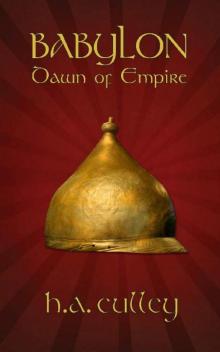 Dawn of Empire
Dawn of Empire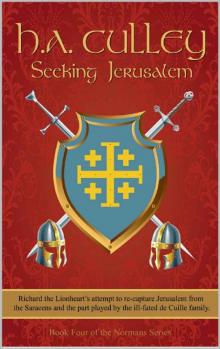 Seeking Jerusalem
Seeking Jerusalem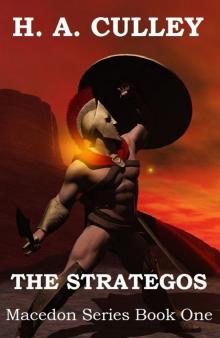 The Strategos
The Strategos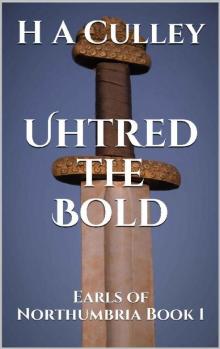 Uhtred the Bold
Uhtred the Bold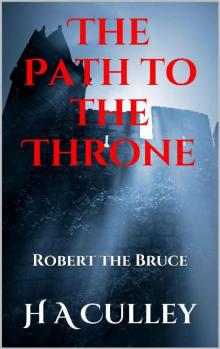 The Path to the Throne
The Path to the Throne The Bastard's Son
The Bastard's Son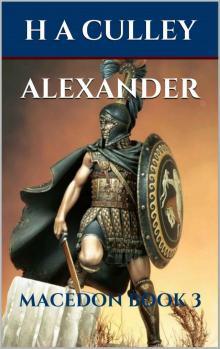 Alexander
Alexander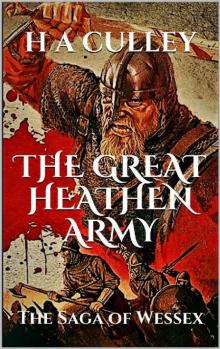 The Great Heathen Army
The Great Heathen Army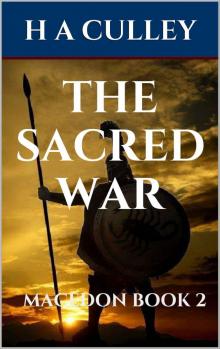 The Sacred War
The Sacred War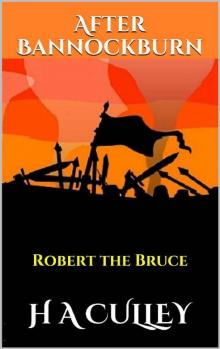 After Bannockburn
After Bannockburn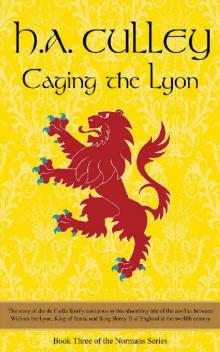 Caging the Lyon
Caging the Lyon The Bastard's Crown
The Bastard's Crown WHITEBLADE
WHITEBLADE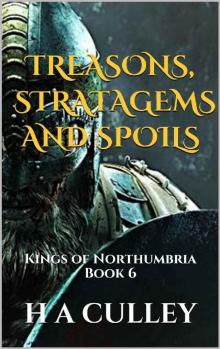 TREASONS, STRATAGEMS AND SPOILS: Kings of Northumbria Book 6
TREASONS, STRATAGEMS AND SPOILS: Kings of Northumbria Book 6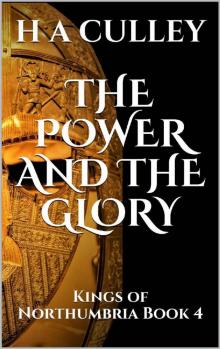 THE POWER AND THE GLORY: Kings of Northumbria Book 4
THE POWER AND THE GLORY: Kings of Northumbria Book 4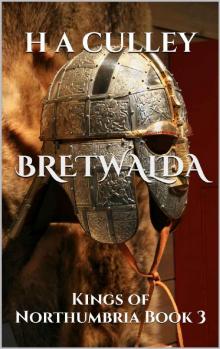 BRETWALDA: Kings of Northumbria Book 3
BRETWALDA: Kings of Northumbria Book 3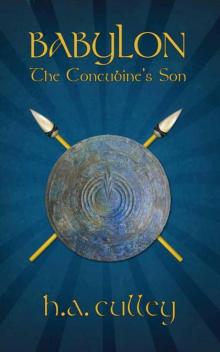 The Concubine's Son
The Concubine's Son The Fall of the House of Æthelfrith: Kings of Northumbria Book 5
The Fall of the House of Æthelfrith: Kings of Northumbria Book 5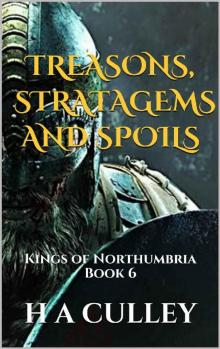 TREASONS, STRATAGEMS AND SPOILS
TREASONS, STRATAGEMS AND SPOILS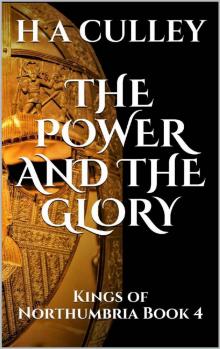 THE POWER AND THE GLORY
THE POWER AND THE GLORY WARRIORS OF THE NORTH
WARRIORS OF THE NORTH The Fall of the House of Æthelfrith
The Fall of the House of Æthelfrith WARRIORS OF THE NORTH: Kings of Northumbria Book 2
WARRIORS OF THE NORTH: Kings of Northumbria Book 2 WHITEBLADE: Kings of Northumbria Book 1
WHITEBLADE: Kings of Northumbria Book 1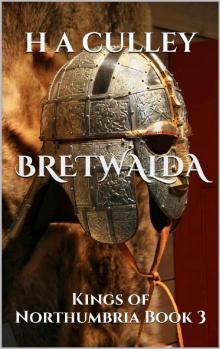 BRETWALDA
BRETWALDA